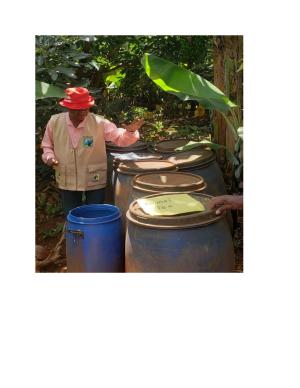Kenya Institute of Organic Farming
Breakdown:
- Accommodation and food: 0.00 Euro
- Transportation: 0.00 Euro
- Activities: 0.00 Euro
- Hosting organisation support: 300 Euro

Description: • The Kenya Institute of Organic Farming (KIOF) is an officially registered technical training institution NO. MOHEST/PC/1361 and Non-Governmental organization (NGO). It is situated in Juja off – Thika highway, near Ndarugo Motel. KIOF launched its first activities in 1987 – The Farmers Training and Extension Programme, which aimed at bringing the awareness of the challenges associated with conventional chemical farming (fertilizers and pesticides) • The advantages of environmentally – sound-farming methods, appropriate to small-scale farmers led to widespread public interest in the program. Numerous requests were received from development organizations in Eastern Africa for training in organic farming. • After the initial strong growth, KIOF found that there was necessity to verifying som
Type of Work: • Organic farming, weeding, tilling the gardens, harvesting produce and livestock farming, • Attend to field visits and trainings organized for farmers engaged in organic farming • The application of appropriate technology on organic farms • Interaction with organic farming students
Study Theme: A RENEWED APPROACH TO AGRICULTURE AND THE ENVIRONMENT • Organic farms and gardens have been operating years in many countries and climates. By reviving and developing sound husbandry practices, they have shown that it is possible to combine good yields with high quality produce, lasting soil fertility and improved overall environment. • The Kenya Institute of Organic Farming (KIOF) aims at making this experience available to all farmers and other stakeholders. • KIOF connects itself especially with the small – scale farmers who make up the majority of the farming community in Kenya.
Accommodation: • The host community will provide a house to accommodate the volunteers with basic living conditions. • Volunteers should climb down to the level of the local people for exposure to development challenges. • KVDA will provide foodstuffs and volunteers will cook their own meals in turns. Water is available from the boreholes and drinking water should be boiled or medicated. Mineral water available at supermarkets is recommended. • There is electricity connection at the project but volunteers can charge their electrical appliances. • Furthermore, we invite you to bring typical food, spices,
Language: English is the language of the work camp. There will be a possibility of learning Kiswahili and other international and local languages, as cultural diversity is a major component in international service
Requirements: What to carry? This is outlined in the detailed info sheet and includes, sleeping bag and mat, toiletries, torch/flashlight, sandals, mosquito net, national flag from your country, among others DONATION AND GIFTS: These are usually symbolic gestures to enhance the solidarity of volunteers and the hosting community. Kindly contact KVDA for details in case you are willing to support a worthy cause
Approximate Location: • The Kenya Institute of Organic Farming (KIOF) is an officially registered technical training institution NO. MOHEST/PC/1361 and Non-Governmental organization (NGO). It is situated in Juja off – Thika highway, near Ndarugo Motel.
Notes: THEME: WHY ORGANIC AGRICULTURE? • A problem in today’s agriculture is the need for cash. This need moves the nation as a whole and especially the farmer into cash crop farming. • Most of which are non – food crops. • The family food production is often neglected. This leads to poorer diets and poorer health of the farming community. The remedy for this situation is organic farming. ORGANIC PRINCIPLES • Organic farming is based on mixed farming principles. Experiences show that mixed farming practices lead to better food and income stability. It does not exclude the cash crop but it puts it in the right place. The cash crop can become part of the farm’s crop rotation, which puts emphasis on diversity of crops thereby raising the ecological balance of the farm. It provides a more complete
